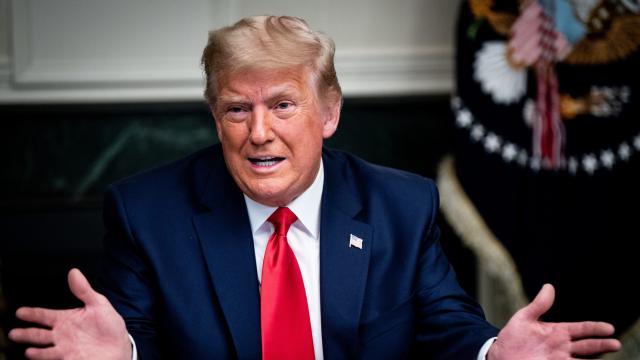The second the clock strikes noon on January 20, 2021, Donald Trump will no longer be the sitting U.S. president, but a man standing before an unprecedented set of legal issues. Staggering debts to a foreign bank and looming investigations from the New York Attorney General’s office and Manhattan District Attorney’s office comprise just a sliver of the impending judicial scrutiny poised to knock Trump-world off its axis. Authorities have already moved to bring various charges against his children.
But Trump hasn’t shied away from using his executive powers to salvage what he can before the walls close in. He’s so far been less than shy about pardoning former associates and cronies, and recent news suggests more are in the works, albeit on a much larger scale: The president is considering issuing preemptive pardons to as many as 20 aides and various associates before his tenure in the Oval Office expires, according to Politico. The seeming effort to protect his staff and family is notably broad, and might spark a question for you: Can the president — any president — actually issue a preemptive pardon to someone who hasn’t been charged with a crime yet, let alone to 20 different people?
The answer, like many deeply entrenched in constitution scholarship and legal debate, is a nuanced one. It should be made clearer by explaining what constitutes a pardon and how they’ve been handled throughout history.
What is a U.S. presidential pardon?
U.S. presidential pardons are an executive power rooted in the Constitution, specifically Article II, Section 2, Clause 1. They pertain specifically to the president’s ability to grant clemency to those charged with federal crimes.
As the National Constitution Centre explains:
The president has pardon or clemency power under Article II, Section 2, Clause 1, of the Constitution, under the Pardon Clause. The clause says the president “shall have Power to grant Reprieves and Pardons for Offences against the United States, except in Cases of Impeachment.” While the president’s powers to pardon seem unlimited, a presidential pardon can only be issued for a federal crime, and pardons can’t be issued for impeachment cases tried and convicted by Congress.
Those who receive pardons while on trial will no longer face prosecution, while those already imprisoned might be released, or see their criminal records expunged.
How do pardons work?
A presidential pardon is when the president protects someone from prosecution for an act they’ve already committed. However, they do not allow anyone suspected of wrongdoing a cart blanche opportunity to begin anew, without fear of repercussions.
As NPR explains:
A president can protect someone from being prosecuted for something they’ve already done, even if it doesn’t come to the attention of prosecutors later — but not protect someone from being prosecuted for something they haven’t yet done, or from being prosecuted by state or local authorities.
There are different types of pardons. As the NCC points out, presidents have five different types of pardoning power at their disposal:
A full pardon relieves a person of wrongdoing and restores any civil rights lost. Amnesty is similar to a full pardon and applies to groups or communities of people. A commutation reduces a sentence from a federal court. A president can also remit fines and forfeitures and issue a reprieve during a sentencing process.
Are they common?
While high-profile examples don’t necessarily typify every presidential administration, they certainly aren’t uncommon. Bill Clinton pardoned 456 people throughout his two terms, many of them cemented in the final hours of his presidency. Though the majority of people comprising that number were regular Americans who had served hard time after being prosecuted for federal crimes, Clinton did manage to sneak in two controversial pardons, one of which was for Marc Rich, a Democratic mega-donor charged with tax evasion.
There are other prominent examples throughout history, too: George H.W. Bush pardoned six people involved in the Iran-Contra scandal that took place during Ronald Reagan’s administration. Perhaps the most notorious example in the last century is Gerald Ford’s pardoning of Richard Nixon after his resignation following the Watergate scandal. This one looms particularly large in American historical memory, largely because it was a preemptive pardon, as Nixon had not been charged with a crime.
As U.S. News & World Report writes: “Ford argued that the pardon was necessary to move beyond the rancor of the Watergate scandal. But the pardon was a factor in Ford’s loss in the 1976 presidential election.”
Preemptive pardons vs. regular pardons
The difference is pretty simple: a traditional pardon involves someone charged or convicted of a federal crime, while a preemptive pardon considers someone who hasn’t yet been charged. As American University professor Jeffrey Crouch told NPR, the president, “does not need to wait until the alleged offender is charged, stands trial, and so on” to issue a pardon preemptively.
So Donald Trump can certainly issue preemptive pardons — but the more significant question is whether he will extend the courtesy to a massive cohort of his inner-circle before his tenure expires.
Can the president pardon himself?
There is no clear-cut answer to this one. It’s a question with no historical precedent, and one that is currently dividing legal scholars. With no formal statute providing a legal framework for the issue, it remains to be seen whether Trump will once again attempt to go where no president has gone before.

Leave a Reply
You must be logged in to post a comment.